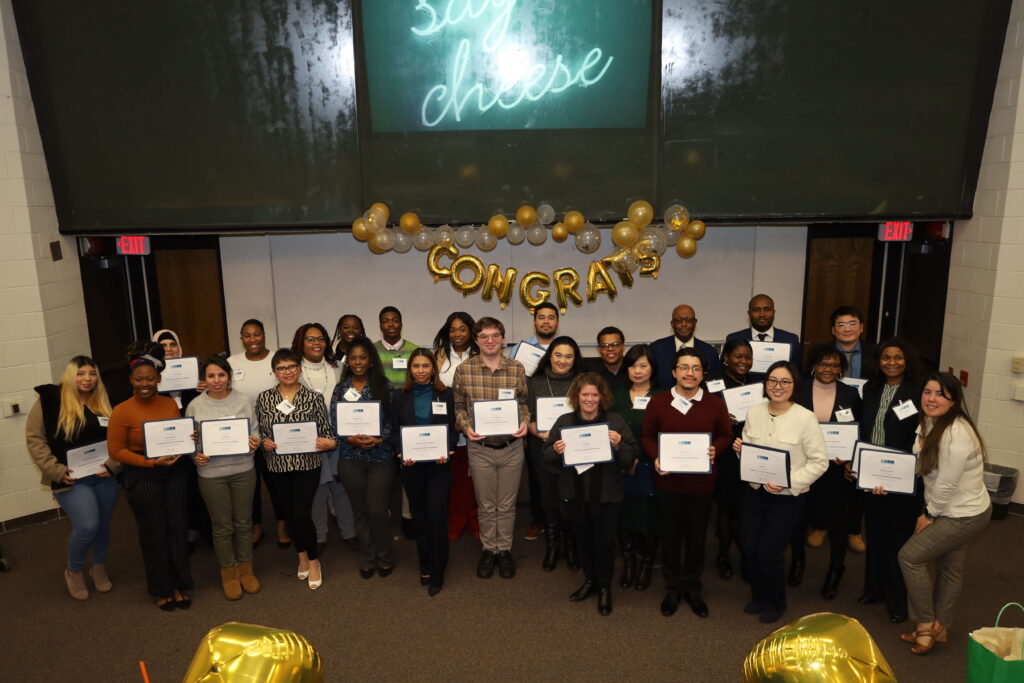Note: This article appeared in the February 11 edition of Commonwealth Beacon.
By Jay Ash and Lane A. Glenn
Massachusetts is the most highly educated state in the nation: According to the U.S. Census Bureau, 47% of adults in the Commonwealth have at least a bachelor’s degree, compared to 36% of Americans overall.
That has a big impact on our workforce: With a larger number of college-educated workers to choose from, employers can, and do, require degrees for jobs that, not that long ago, or in other, less-educated states, don’t require them. Consequently, “credential inflation” here in the Bay State hinders employers and potential workers alike, especially right now, in one of the tightest labor markets in history.
A report about education and economic strength from the Mass Budget and Policy Center reveals that nearly a decade ago Massachusetts became the first state in the nation where more than half of workers have a bachelor’s degree or higher. And, while college-educated workers earn about 80% more than those with only high school diplomas nationally, here in Massachusetts their paychecks are nearly doubled.
That’s great if you’re among the highly educated and well compensated, but the reality is Massachusetts relies on importing degree holders from other states and other countries for many of those higher-paying jobs, while too many of our residents don’t have the credentials needed to compete for them: Half of White Bay-staters have that coveted bachelor’s degree, compared to only 33% of Black residents and 23% of Hispanic residents.
That means that, in a state where around 75% of jobs that pay family-sustaining wages require a bachelor’s degree, more than two-thirds of Black and Hispanic residents won’t even be considered.
Thankfully, that is changing, led by a number of forward-thinking employers, like Massachusetts Competitive Partnership member Vertex Pharmaceuticals, which is “rethinking education and the future of work” by reducing or eliminating degree requirements and partnering with community organizations like Year Up to recruit and prepare women and underrepresented groups for STEM careers; and by Governor Healey and her administration, which recently announced its “Lead by Example Employer Talent Initiative,” which directs state agencies to only include degree requirements when they are absolutely necessary to perform a job, and to “utilize skills-based employment practices to attract, recruit, hire, retain, and develop workers.”
What is Skills-Based Hiring?
Very simply, skills-based hiring is an approach to writing job descriptions and recruiting candidates that focuses on evaluating their skills, rather than on their educational credentials or past work experience.
It’s a way of expanding your talent pool while reducing bias, increasing diversity, and actually improving the quality of your new hires and the chances that they will be a good fit for their jobs and your organization—and even stick around longer.
How Can Employers Implement Skills-Based Hiring Practices?
If you are an employer and want to follow the lead of the Commonwealth and innovative companies like Vertex, there are some simple steps you can take, like:
Learn About Skills-Based Hiring
There are plenty of free resources available, like “How to Get Started with Skills-Based Hiring” from the LinkedIn Talent Blog, or “Skills-Based Practices: An Employer Journey Map” created by Jobs for the Future.
Organizations that belong to the Society for Human Resource Management will find plenty of advice and toolkits; and, quickly on the heels of Governor Healey’s announcement, and as a way of leading by example, Massachusetts has already created Skills-Based Hiring at the Commonwealth: Strategic Practices for Commonwealth Hiring Managers.
Review, Revise, and “Right-Size” Job Descriptions
As LinkedIn notes (and they should know), “Skills-Based Hiring Starts with Your Job Descriptions.” Shifting the focus from “requirements” like degrees and years of experience to “responsibilities” that include the most important job skills and competencies will attract more candidates to your job postings (LinkedIn reports a 14% increase in applications per view for posts that highlight “responsibilities” rather than “requirements”), and better ensure that the ones who are hired know what they are doing.
When hiring a cybersecurity project manager, for example, resist the urge to require a BS degree in Computer Science and five years of experience in a specific industry setting; and instead, be explicit about the skills needed, such as providing cost benefit analysis reports and using standard ICT (Information and Communication Technology) tools; and offer a variety of ways of demonstrating those skills, such as assessment tests developed for the hiring process, and alternative “microcredentials” such as Project Management and Agile certifications.
Once you know your organization is ready to commit to this approach, platforms like Lightcast or Grads of Lifeprovide a range of fee-based services, from drafting skills-based job descriptions, to casting wider recruitment nets, to partnering with educational institutions to align training programs with company or industry needs.
Create New Educational and Training Opportunities
When the bachelor’s degree is no longer the default credential that gets candidates in the door, employers have the freedom to develop a much wider range of educational and training opportunities to prepare the workforce they need, and Massachusetts community colleges can be ideal partners.
In a recent article for American Compass, founder of the Pathways to Prosperity Network and Senior Advisor to the Harvard Project on Workforce Robert Schwartz noted, “At their best, community colleges are the most nimble, flexible, market-oriented institutions in our higher education system, working closely with employers to meet regional labor market demands.”
As an example, several years ago, life science employers in the Merrimack Valley noticed that the people they were hiring with bachelor’s degrees and master’s degrees for entry level positions knew a lot, but were not always prepared to do what was needed in the laboratory. They also earned high salaries and didn’t stay long.
Northern Essex Community College, New England’s first Hispanic-Serving Institution, with campuses in Haverhill and Lawrence, partnered with those employers to create a new Associate of Applied Science in Laboratory Science degree, with options in biotechnology, environmental sciences, and analytical chemistry, and a required internship in the final semester that immerses students in the real world of life science work.
Not surprisingly, with the hands-on, practical skills they develop in the program and the opportunity to get to know students through the internship, employers frequently hire students directly into full-time jobs at graduation—jobs that used to be reserved for advanced degree holders. Many of those associate degree grads still continue their education at four-year universities, but they are already earning good livings, with more opportunities for advancement ahead.
Some jobs may not even require a full associate degree. Community colleges also offer a wide range of both credit and non-credit microcredentials and certificates that can take anywhere from a few weeks to a year to complete and can be tailored to the needs of employers.
The “Be Mass Competitive Program,” launched by the Massachusetts Competitive Partnership and Bunker Hill Community College, recruits participants without college degrees, mostly people of color, from Boston communities, and provides them with ten weeks of classes to develop skills for entry level positions in customer service and administrative professional careers, and ten weeks of paid, on-the-job training.

The most recent class graduated in December and landed in jobs at Bank of America, Boston Scientific, John Hancock, and Mass General Brigham. It’s a win-win-win-win for workers, employers, colleges, and the Commonwealth.
Opportunity Ahead
In a high-tech, advanced skills economy like ours, there will always be a need for bachelor’s and graduate degrees from our state’s outstanding universities; but right now, demand is far outpacing supply, with no sign of relief ahead.
A recent brief from MassINC, “Sizing Up Massachusetts’ Looming Skilled Worker Shortage,” predicts that by 2030, if we keep doing things the way we’ve always done them, the state could be nearly 200,000 college-educated workers short for the labor force we need.
We don’t need to keep doing things the way we’ve always done them.
In “Eliminate a Degree of Difficulty: Hire for Skills, Not School,” Bain & Company estimates that more than 60% of middle-skilled jobs that pay family-sustaining wages are actually “soft bachelor’s” jobs that don’t really need those degrees.
That’s 120,000 opportunities between now and 2030 for employers in Massachusetts to use skills-based hiring and tap into a bigger, more diverse talent pool that is right for the job.
Jay Ash is a former secretary of housing and economic development. He is president and CEO of the Massachusetts Competitive Partnership. Lane A. Glenn is president of Northern Essex Community College.






